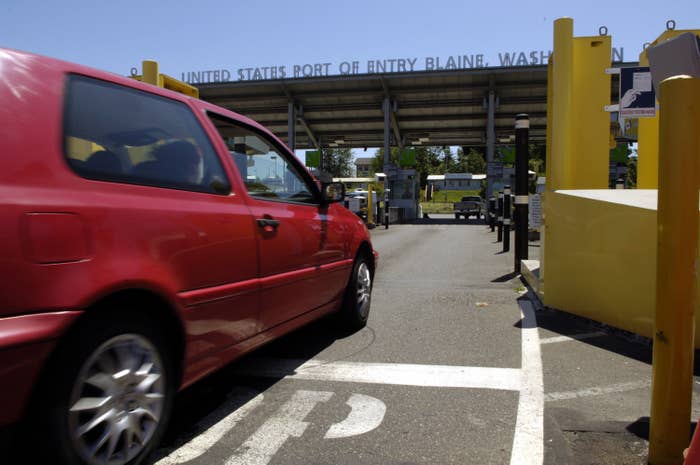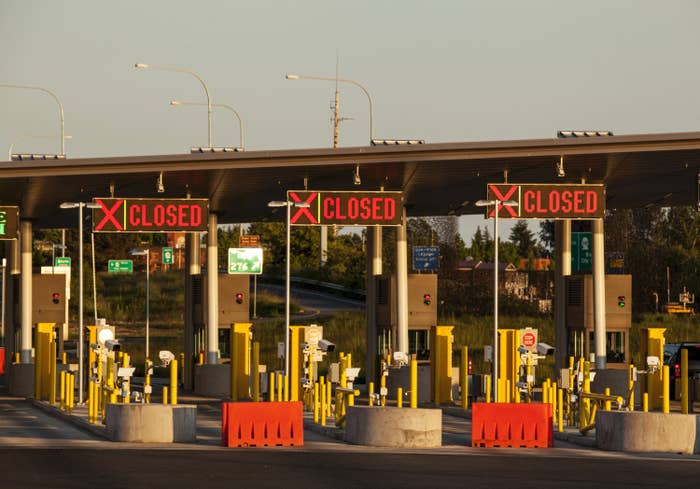
Customs and Border Protection officials in DC scrambled to get more information from an official border crossing in Washington state this weekend when they heard reports that officers were questioning Iranian-born US citizens and residents for hours.
In an email sent to congressional staff on Monday and first reported by CNN, a CBP liaison said they contacted the port of entry in Blaine, Washington, for additional information and discussion to make sure people being sent to secondary inspection were being screened on a "totality of circumstances."
Over the weekend, reports emerged of US citizens and permanent residents of Iranian descent being questioned in secondary inspection at the Blaine port of entry for hours. They were asked about their families, where they lived, their occupations, and whether they served in the military.
There's no official number detailing how many people of Iranian descent were sent to secondary inspection this past weekend after trying to enter the US through Blaine, but the Council on American–Islamic Relations’ Washington state branch said there were “more than 60.” An attorney told BuzzFeed News the number was at least 40.
The increased screenings at Blaine came on the heels of escalating tension between the US and Iran. For days, each country threatened military strikes after President Donald Trump ordered a drone strike that killed Gen. Qassem Soleimani, a top Iranian military commander who directed bloody conflicts around the Middle East. His death came days after Iranian-backed militia threatened staffers at the US Embassy in Baghdad.
CBP officials reiterated in the email that there is “no national directive, memo, etc. from [the Department of Homeland Security] or CBP leadership with instructions to detain Iranian-Americans and refusing their entry into the U.S because of their country of origin.”
A news release from CAIR and a viral tweet citing "a source at CBP" who said DHS issued "a national order to CBP to 'report' and detain anyone with Iranian heritage entering the country who is deemed potentially suspicious or 'adversarial,' regardless of citizenship status" sparked widespread concern.
CBP officials quickly pushed back and called the reports false.
The email to staffers detailed how on Friday, the day before CBP officers in Blaine started sending people of Iranian descent to secondary screening, Mark Morgan, the agency's acting commissioner, had a call with leaders from field offices across the country to “remain vigilant and increase their situational awareness given the evolving threat environment.” The next day, acting DHS Secretary Chad Wolf issued a National Terrorism Advisory System bulletin detailing potential threats from Iran.
“Again, there is no national directive from DHS or CBP leadership with instructions to detain Iranian-Americans and refusing their entry into the U.S because of their country of origin,” the email stated. “Field Leadership has discretion on how to enhance operational posture based upon the totality of circumstances, including [area-]specific information.”
CBP officials reached out to those at the Blaine port of entry for “additional information and discussion to ensure that secondary screening determinations are based upon a totality of circumstances," the email added.

John Sandweg, a former senior DHS leader under the Obama administration, said the statement sent to congressional officials appeared to indicate that local authorities in Blaine had taken the guidance to remain vigilant and sent many people of Iranian descent to secondary questioning at the border.
“The field office probably got aggressive on how to implement the enhanced security posture,” he said. “I think it’s code for they dialed it back pretty quickly.”
Secondary screening occurs on a daily basis and involves probing questions about past travel history and other matters.
“It is intrusive and it is time-consuming,” Sandweg said. “Nobody wants to be in secondary screening.”
Leonard Saunders, an immigration attorney based in Blaine, had two clients who were questioned over the weekend by CBP and held in secondary inspection for hours.
One of them, who became a US citizen in November, was coming back to the country when she was sent to secondary screening by CBP on Saturday. She texted him about what was happening and said there were 50 to 75 people of Iranian descent waiting alongside her. It was the first time she had traveled out of the US since becoming a citizen.
Saunders went to the port of entry and was told by a CBP officer who rolled their eyes that the increased screenings were "orders from above."
"They said, 'We're doing extreme vetting right now. This is a complete waste of time, but we're just following orders,'" Saunders recalled.
At the secondary screening area, he saw a line of people stretching for half a block who were told to sit down by CBP officers because they knew it would take hours to process them. Officers also ended up handing out juice boxes, crackers, and prepackaged fruit to people waiting.
"I have never seen anything like that," he said. "I have never seen a group of profiled individuals sitting there for such a length of time — basically being detained even though some were US citizens."

